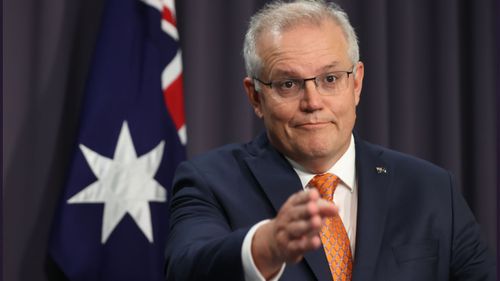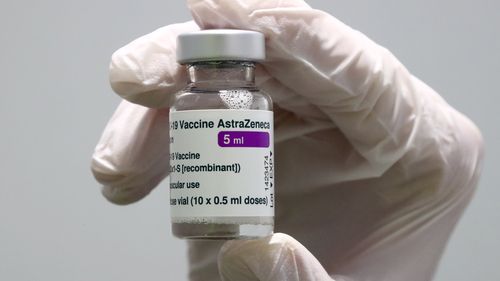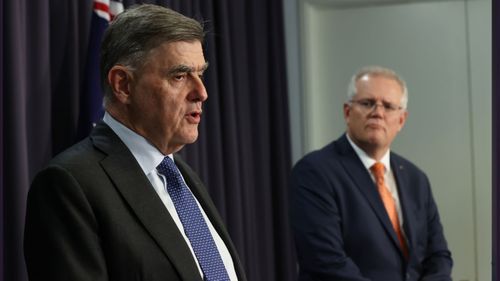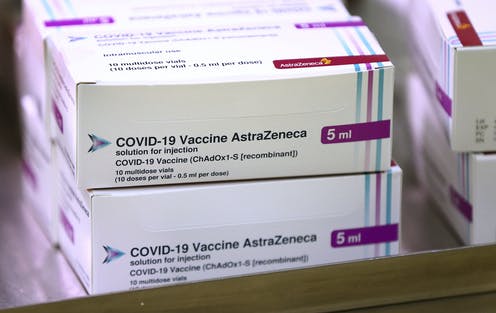Pfizer vaccine recommended instead of AstraZeneca for adults under age of 50
The Australian COVID-19 vaccination rollout is up in the air after Scott Morrison advised the AstraZeneca jab should not be used by people under the age of 50.
The Prime Minister called a snap press conference at 7.15pm AEST to announce the “recalibration” of the Australian rollout, after receiving medical advice in “the last 15 minutes” over the potential blood clot risks for younger people.
The Australian Technical Advisory Group on Immunisation (ATAGI) recommends the AstraZeneca coronavirus vaccine should be used by those over the age of 50, while the Pfizer jab should be taken up by younger Australians.

It gave three main recommendations:
- People under 50 should be given the Pfizer vaccine instead of AstraZeneca
- A first dose of AstraZeneca COVID-19 vaccine should only be given to adults under 50 years of age where benefit clearly outweighs the risk for that individual’s circumstance
- People that have had their first dose of the COVID-19 AstraZeneca without any serious adverse events can safely be given their second dose
“We thought it was important that we came and briefed you on that this evening so it was available immediately to Australians,” Mr Morrison said.
Vaccine rollout could be further delayed
The change to the advice regarding vaccines has now raised questions about whether all Australians will be vaccinated by the end of 2021.
When asked, the Prime Minister said he did not have an update to the rollout timeline and “we have to take the time to assess the implications for the program”.
“When we’ve done that, we may be able to form a view. But I don’t think anyone should expect that any time soon,” Mr Morrison said.
“It won’t stop the work that we’re doing in rolling out the vaccination program right now with the doses that we have, particularly from Pfizer, but also rolling out from AstraZeneca, which are predominantly for older Australians above 50 in phases 1A and 1B.”

Reactions ‘very rare’
Australia’s Chief Health Officer Paul Kelly said an adverse reaction from the AstraZeneca vaccine is very rare.
“At the moment, it seems to be around four to six per million doses of vaccine,” Dr Kelly said.
“It’s only been found in the first dose of the AstraZeneca vaccine, usually within four to 10 days after that vaccine.
“But it is serious, and it can cause up to a 25 per cent death rate when it occurs.”
Late Thursday night, AstraZeneca Australia put out a statement saying it respected the government’s decision and had been collaborating with regulators and advisory groups around the world, including in Australia, to understand any possible cause of the clots.
“The World Health Organisation (WHO) noted today that, whilst concerning, the events under assessment are very rare, with low numbers reported among the almost 200 million individuals who have received the AstraZeneca COVID-19 vaccine around the world,” the Anglo-Swedish drugmaker said.
“Overall, regulatory agencies have reaffirmed the vaccine offers a high-level of protection against all severities of COVID-19 and that these benefits continue to far outweigh the risks.”
Professor Kelly said the use of the Pfizer vaccine is preferred over the AstraZeneca vaccine in adults “aged less than 50 years who have not already received a first dose of AstraZeneca vaccine”.
“Immunisation providers should only give a first dose of AstraZeneca COVID-19 vaccine to adults under 50 years of age where benefit clearly outweighs the risk for that individual’s circumstances,” the Chief Medical Officer said.
“The third recommendation is people that have had their first dose of the COVID-19 AstraZeneca without any serious adverse events can safely be given their second dose.”
Professor Kelly said it is nearly impossible to predict who will develop a blood clot after getting the AstraZeneca vaccine.
‘It seems it comes virtually spontaneously,” he said.
“It can’t be predicted because of what people have had in the past, particular diseases – the only one thing is, if you’ve had this with the first AstraZeneca vaccine, you don’t have the second.”
‘Precautionary position’
Secretary of the Department of Health Professor Brendan Murphy said the decision to attach an advisory for under 50s to the AstraZenca vaccine is a precautionary measure.
“This is a very, very rare event, and it is a highly precautionary position that Australia can take because we’re in a fortunate position with COVID,” Professor Murphy said.

“All vaccines have adverse effects. Some serious. Flu vaccines do. The Pfizer vaccine has a risk of anaphylaxis, which we’ve seen.
“But this syndrome, after all of the work we’ve done with the UK and Europe, does seem to be a real syndrome, and we now feel that, at an abundance of caution, given that this syndrome seems to occur mainly in younger people for whom the risk of severe COVID is not so great, that there is a basis to have a preferred recommendation for those under 50.”
There is now work in place to exchange Pfizer vaccines already sent to aged care facilities with AstraZeneca shots.








